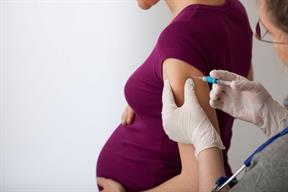Flu During Pregnancy
Influenza, also called the flu, is a common infection of the respiratory tract, which is your nose, throat, and lungs. The flu can cause mild to severe illness.
If you're pregnant, you're more likely to catch the flu. You're also more likely to get very sick from the flu. This is because pregnancy changes your heart, lungs, and the body's disease-fighting system. If you get very sick from the flu, this can cause problems for you and your unborn baby.
How do people get the flu?
The flu is caused by a type of germ called a virus. You can get the virus by:
Being near a sick person who is coughing or sneezing.
Touching something that has the virus on it and then touching your mouth, nose, or face.
How does the flu affect me?
If you have the flu while you're pregnant, you may have these symptoms:
Some problems may come from having the flu. They include:
Pneumonia.
Ear or sinus infection.
If the flu becomes very bad, you may need to be treated in the hospital.
How does the flu affect my baby?
The flu may also affect your unborn baby. It may cause:
What actions can I take to protect myself against the flu?

- Get a flu shot. The best way to prevent the flu is to get a flu shot before flu season starts.
-
Wash your hands often with soap and water for at least 20 seconds. If soap and water aren't available, use alcohol-based hand sanitizer.
-
Do not come in close contact with sick people.
-
Do not share food, drinks, or utensils with other people.
-
Avoid touching your eyes, nose, and mouth before washing hands.
-
Clean frequently used surfaces at home, school, or work.
What should I do if I have flu symptoms?

-
If you have any symptoms of the flu, even after getting a flu shot, contact your health care provider right away.
-
To treat fever, take over-the-counter medicines as told by your provider.
-
If you have the flu, your provider may give you medicine to keep the flu from becoming severe and to shorten how long it lasts.
- Avoid spreading the flu to others:
Follow these instructions at home:
- Take your medicines only as told.
-
Eat a healthy diet that includes fresh fruits and vegetables, whole grains, lean protein, and low-fat dairy.
-
Drink more fluids as told.
-
Get plenty of rest.
Contact a health care provider if:
-
You have a fever or chills.
-
You have a cough, sore throat, or stuffy nose.
-
You have worsening or unusual muscle aches, headache, tiredness, or loss of appetite.
-
You throw up or have diarrhea.
-
Your symptoms do not improve, even with treatment.
-
Your baby is moving less than usual.
-
You faint, have a seizure, or can't think clearly.
-
You have pain in your chest or trouble breathing.
-
You have a sudden, sharp pain in the belly.
-
You have cramping in your belly or have pain in your hips or lower back.
These symptoms may be an emergency. Get help right away. Call 911.
This information is not intended to replace advice given to you by your health care provider. Make sure you discuss any questions you have with your health care provider.

